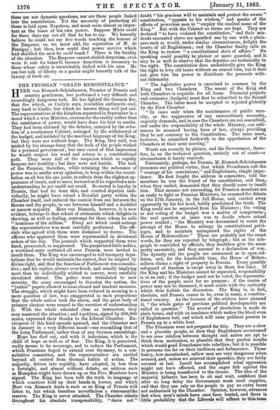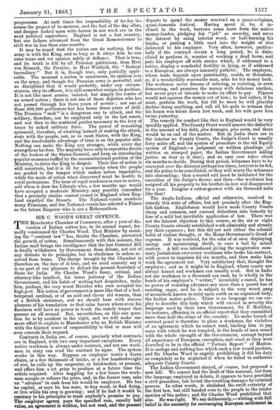THE PRUSSIAN " GRAND REMONSTRANCE."
HERR von Bismark-Schiinhausen, Premier of Prussia and country gentleman, has performed a very difficult and exceedingly dangerous task. He has lighted the German fire, that fire which, as Carlyle says, resembles anthracite coal, very hard to kindle, but which no known thing will put out. The representatives of the kingdom separated in September in a mood which a wise Minister, anxious for the reality rather than the semblance of power, would have done his best to soothe. They had been alarmed by the debates, annoyed by the selec- tion of a reactionary Cabinet, outraged by the withdrawal of the budget, and irritated by the martinet language of the King; but they were not without hope. The King, they said, was misled by his strange fancy that the bulk of the people wished for a personal government ; but once cured of that impression he would respect his word and return to a constitutional path. They were full of the suspicion which so rapidly deepens into hostility ; but they were not hostile. The task of the Premier, therefore, while retaining the substance of power was to soothe away agitation, to keep within the consti- tution on all but his one point, to refrain from the slightest ap- pearance of insult, and to move forward as if he regretted a mis- understanding be yet could not avoid. So rooted is loyalty in Prussia, that had he done this, and courted deputies indi- vidually, he might have raised a Royalist party within the Chamber itself, and reduced the contest from one between the throne and the people, to one between himself and a doubtful or narrow majority. Herr von Bismark, however, it is now evident, belongs to that school of aristocrats which delights in showing, as well as feeling, contempt for those whom he calls " nominees of the million." Every act which could outrage the representatives was most carefully performed. The offi- cials who agreed with them were dismissed by decree. The officers who approved them were reprimanded in divisional orders of the day. The journals which supported them were fined, prosecuted, or suppressed. The pauperized little nobles, a wretched caste scattered all over Prussia, were invited to insult them. The King was encouraged to tell trumpery depu- tations that he would maintain the contest, that he reigned by divine right, and that the function of Parliament was consulta- tive ; and his replies, always over frank, and usually implying more than he individually wished to convey, were carefully circulated abroad. The police were stimulated to new severity, the army encouraged to threaten the nation, the "junker" papers allowed to issue absurd and insolent menaces. The struggle, which might have been reduced in seeming to a mere question of law, was exaggerated to such proportions that the whole nation took the alarm, and the great body of primary electors were roused to the exertion of understanding it. With the whole educated class as instructors, they soon mastered the situation ; and a petition, signed by 200,000 males, expressed their thanks to the Liberal Chamber. Ex- citement of this kind spreads upward, and the Chamber met in January in a very different mood—one resembling that of the Long Parliament, rather than of any German assemblage. Hope has died out, and with it indecision, which is the child of hope as well as of fear. The King, it is perceived, really means to be sovereign, and to reduce the Parliament, which Prussians hoped to extend over Germany, to a con- sultative committee, and the representatives are excited beyond all control from German habits of action. The majority, driven into rapidity, have adopted, in less than a fortnight, and almost without debate, an address such as Hampden might have drawn up or the Five Members have signed. The King has been told the truth in language at which courtiers hold up their hands in horror, and which Herr von Bismark hints is such as no King of Prussia will listen to, but which breathes nevertheless a statesmanlike reserve. The King is never attacked. The Chamber admits throughout his absolute irresponsibility, " dares not " doubt " his gracious will to maintain and protect the sworn " constitution, " appeals to his wisdom," and speaks of the efforts of powerless men to " employ the exalted name of the King." But with the Cabinet no terms are kept. They are declared " to have violated the constitution," and their mis- deeds recounted above are specified one by one with a plain- ness such as would, under similar circumstances, delight the• hearts of all Englishmen ; and the Chamber finally calls on the King to restore " a constitutional state of affairs." No speaking could possibly be plainer or more guarded, and it. may be as well to observe that the deputies are technically ins the right. The constitution does undoubtedly give the King the right to levy old taxes without an annual vote, but it does not give him the power to distribute the proceeds with- out indemnity.
" The legislative power is exercised in common by the King and two Chambers. The assent of the King and both Chambers is requisite for all loans. Financial projects and estimates (budgets) must first be submitted to the Second' Chamber. The latter must be accepted or rejected globably by the First Chamber. " In cases only when the maintenance of public secu- rity, or the suppression of any extraordinary necessity„ urgently demands, and in case the Chambers are not assembled,. and under the responsibility of the whole Ministry, can ordi- nances be assumed having force of law, always providing- they be not contrary to the Constitution. The same must, however, be submitted forthwith to the approbation of the- Chambers at their next meeting."
Words can scarcely be plainer, and the Government, there- fore, is, on the technical question, entirely out of court—a circumstance it barely conceals. Fortunately, perhaps, for Prussia, M. Bismark-Schiinhausetr possesses one political virtue, that which Frenchmen call the. " courage of his convictions," and Englishmen, simple impu- dence. He first fought the address in committee, told the members he was the friend of the constitution, and then, when they smiled, demanded that they should cease to insult him. That menace not succeeding, for Prussian members area as ready to fight as Prussian Ministers, ho resumed the debate on the 27th January, in the full House, and, carried away apparently by his hot head, boldly proclaimed the truth. The King could not be separated from his Ministers ; the voting. or not voting of the budget was a matter of compromise ;. the real question at issue was to decide where actual. power resided ; " the Ministry was determined to resist the attempt of the House to enlarge its constitutional privi- leges, and to maintain unimpaired the rights of the House of Hohenzollern." These are probably not the exact. words, for they are reported by telegraph ; but as the tele graph is controlled by officials, they doubtless give the sense• pretty accurately, and they amount to a declaration of war_ The dynasty and the people are announced as in open col- lision, and, for the hundredth time, the House of Hohen- zollern claims a right of property in Prussia. Every 'possible safeguard of freedom is swept away in those few lines. If the King and his Ministers cannot be separated, responsibility is at an end ; if the budget need not be voted, the representa- tives of the people meet for no purpose ; if the centre of power may not be discussed, it must reside with the authority which thus forbids the discussion. The King is, in fact, absolute, and Prussia ceases to be, even in name, a constitu- tional country. As the framers of the address have phrased it, " the whole gains of previous political developments are called in question." The avowal of absolutism is made in. plain terms, and with an insolence which makes the blood even. of Englishmen boil, and which will raise political passion in. Prussia up to a white heat. The Prussians were not prepared for this. They are a slow and a placable people, so slow that Englishmen accustomed to see some relation between thought and action are apt to. think them motionless, so placable that they pardon insults. which would goad Frenchmen into rebellion; but it is possible to presume too far on their tardiness and forbearance. Those- heavy, tow-moustached, sallow men are very dangerous when. aroused, and, unless we misread their speeches, they are fairly aroused at last. Insult has accomplished what oppression might not have effected, and the anger felt against the Ministry is being transferred to the throne. The idea of the majority hitherto has been to sit and wait, confident that after no long delay the Government must need supplies, and that they can rely on the people to pay no extra taxes not authorized by the Chamber. Opinion, however, advances fast when men's minds have once been heated, and there is little probability that the Liberals will adhere to thistamo programme. At such times the impossibility of to-lay be. comes the project of to-morrow, and the fact of the day after, and designs looked upon with horror in one week are in the next political aspirations. England is not a fast country, but our fathers advanced from the Great Remonstrance to civil war in less than nine months.
It may be urged that the nation can do nothing, for the army is with the King, and so long as it obeys him he can raise taxes and set opinion safely at defiance. That is true, and its truth is felt by all Prussian politicians, from Herr on Bismark, the Premier, to Herr Waldeck, the " Radical incendiary." But it is, though true, only partially appli- cable. The moment a nation is unanimous, its opinion acts on the army, and though the Prussian army is powerful, and so disciplined that it would probably, under any circum- stances, obey its officers, it is still somewhat unique in position. It is not like most armies, isolated, but simply the centre of an armed nation ; there is not one of these deputies who has not passed through his three years of service ; not one of those 200,000 petitioners but has borne three years of drill. The Prussian " mob" is a. dangerous one to attack, and the -soldiery, therefore, can be employed only in the last resort, and not then in the scattered parties necessary to the levy of taxes by naked military force. The power of remaining quiescent, therefore, of awaiting instead of making the attack, rests with the people, not, as in most States, with the King, and the incalculable advantage of time is on the popular side. Nothing can make the King any stronger, while every day 'strengthens his foes. The majority have only to repeat the device of the leaders of the States-General, and keep on introducing popular measures baffled by the unconstitutional position of the Ministry, to drive the King to despair. Their line of action is still uncertain, but it is ill for a monarchy when the people are goaded to the temper which makes action imperative, while the mode of action when discovered must be hostile to royal pretensions. The hour of royal weakness is sure to arrive, -and when it does the Liberals who, a few months ago would have accepted a moderate Ministry, may possibly remember that a precisely similar contest ceased in England when Eng- land expelled the Stuarts. The National-verein numbers many Prussians, and the National-verein has selected a Prince as the future Emperor who is not a Hohenzollern.































 Previous page
Previous page